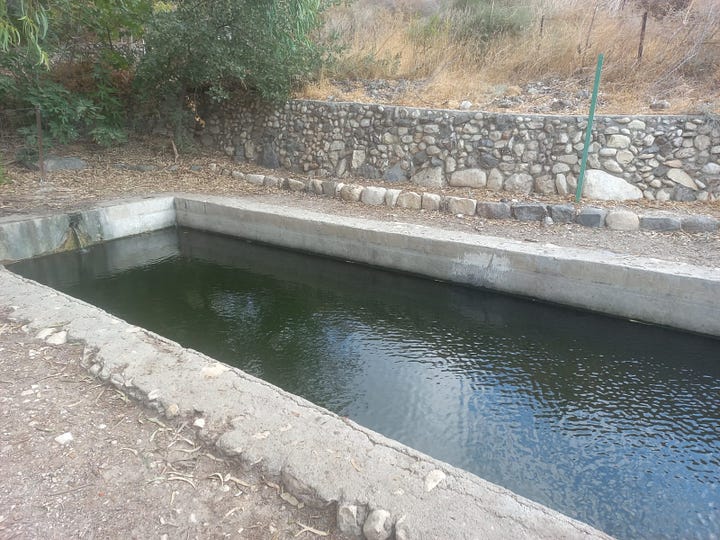In Defense of Desire
Wanting to eat is good. So don’t smother desire with food.
Dear Healthy Jew,
We’re working on nutrition these days at Healthy Jew. Last week we learned from Maimonides how healthy eating begins with food quantity. I also suggested that an important reason to eat healthy foods as balanced meals is to encourage moderation.
Today we’re going to look at Maimonides’ – really, our body’s – message that’s implied by our health requiring us to feel hungry and avoid complete satiation. Isn’t it odd that wellness hinges on not doing what feels natural? Why were our stomachs built to lie?
A superficial reason might be because eating – a sensual, material drive - is a necessary evil and should be limited to a minimum. But Maimonides didn’t write that, and just in the previous chapter of The Laws of Character he clarified how Judaism is against ascetism. Instead, as he explained, Judaism supports balanced and healthy eating for the purpose of knowing and and emulating God.
And yet, as we learned, Maimonides taught in the following chapter that eating healthfully includes dwelling in desire. Let yourself feel hungry. Don’t get too satisfied. As King Solomon taught, “guard your mouth.”
My conclusion from all this? Eating isn’t bad – but desiring food is good. Let’s consider how that can be.
We usually think of desire as wanting something that we currently don’t have; if we had it, we wouldn’t want it. For example, the mouthwatering steak or cake invites us to satisfy our desire with pleasure, from the outside in. Of course, we instinctively avoid dwelling in such desire. It’s uncomfortable to want what we lack: food, love, prestige, money. We want satisfaction, not to want.
What happens to the desire when we receive or achieve its object? The pleasure nullifies it; we can’t want what we already have. We’ve reached contentment and the awful emptiness was filled – for a while. But nothing in the material world lasts too long, including satisfaction. Soon satiety gives way to hunger, blissful romance to boredom. The accolades turn stale; the money isn’t enough. Then desire returns – together with the terrible emptiness - until it can be satisfied again, hopefully with something better and different. And the cycle continues.
This sort of desire seeks nullification by satisfaction. Desire itself has no value; it’s merely a signal to find fulfillment. Maimonides wouldn’t arrange his dietary advice around living in meaningless, uncomfortable, and self-abolishing desire.
But there’s another sort of desire that doesn’t self-destruct: the experience of life as continuously coming into being, an unfolding flow of existence that never ends.
Dead, inanimate objects are given their specific form and keep it until it’s lost. For example, a table is built and remains a table until something ends its tablehood, say, a fire. Live beings, however, receive new life every moment. Last minute’s breath won’t oxygenate my blood now. Yesterday’s meal won’t satisfy me today; its nutrients are long gone. Closer to life’s essence, my spirit constantly imbues my body with new life, and my mind directs its movements. When beheld in depth, life is not a noun but a verb – the perpetual flow of existence, emanating from the inside outwards. For this reason, life is depicted throughout Scripture as a spring that flows out from under the ground to whoever wishes to receive it.
We’ll return one day, I’m sure, to take a closer look at the verb of life. What concerns us now is the good type of desire that arises from true life: the desire for desire itself, not satisfaction from the outside. If I’m alive, that means I want more life, because the essence of life is the uninterrupted flow of becoming alive. If I don’t want more life, but am satisfied with remaining stationary and static forever, then I’m already dead as a table. Even the smallest particle of life demands – that is, desires – to continue its flow forever.
This good desire is comfortable, natural and neutral, for it is the stuff from which good life is composed. And it’s not some abstract, spiritual concept, but a practical way to transform desire from self-nullifying to self-perpetuating.
We desire physical and emotional pleasures because they hold the goodness of life, the experience of flowing out into existence. There’s nothing wrong with wanting food, love, prestige, or money. Those are the things that keep the world going around – when we’re fine with wanting them. But how much of them do we need? Enough to experience life’s goodness without destroying the precious desire for more, even for a moment. In the life-as-a-spring analogy, we live well when dwelling close to the mouth of the spring, dipping in regularly to taste its cool waters - while taking care not to block the source by stuffing our face inside it.


Maimonides taught here that health depends on life’s core desires remaining vibrant and desirable. Therefore, he advised, we should eat enough healthful foods to replenish our bodies and spirits – but only when hungry, and even then, leave some space for desire to remain. When eaten this way, delicious food enriches desire instead of destroying it.
On that note, I’m hungry now. Not a problem to solve, but a clear sign that I’m deeply alive. So I’m going to experience my desire to eat by eating supper. If I eat well, I’ll heed King Solomon’s advice and guard from smothering my desire with food.
One Suggestion: Experiment with dwelling in desire to eat. Instead of rushing to extinguish the desire, sit with it. Then eat, leaving some room to eat more. Pay attention to how desiring and eating this way feel.
Thank you for reading Healthy Jew.
Here are 2 great paths to continue the journey:
Also check out this intro and index to explore hundreds of posts about our 3 Healthy Jew topics: Wellness with Wisdom, Land of Life (Israel), and Sensible Spirituality.
Finally, always feel free to reach out here with any comments, questions, or complaints:
I look forward to hearing from you!
Be well,
Rabbi Shmuel Chaim Naiman
Please note: All content published on Healthy Jew is for informational and educational purposes only. Talk to a qualified professional before taking any action or substance that you read about here.










Great read!
"But there’s another sort of desire that doesn’t self-destruct: the experience of life as continuously coming into being, an unfolding flow of existence that never ends."
Nice.